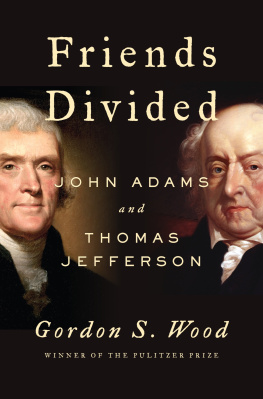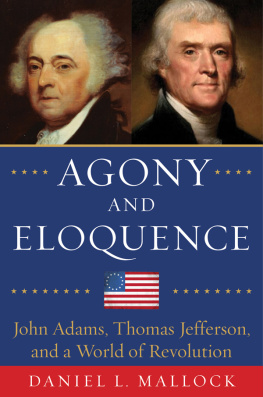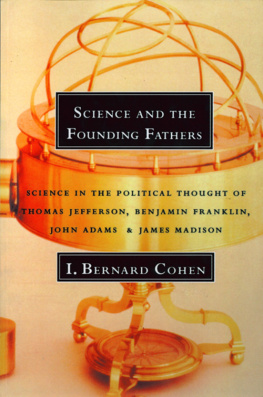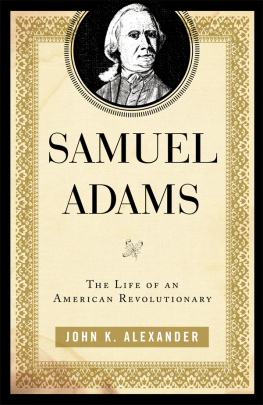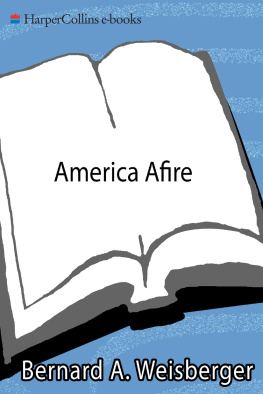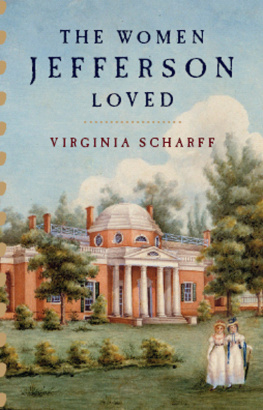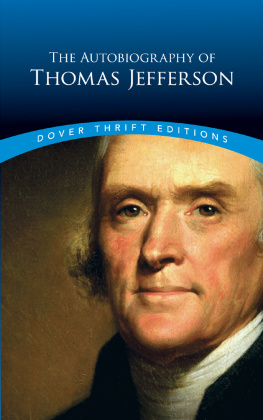ALSO BY G ORDON S. W O OD
The Idea of America
The Creation of the American Republic, 17761787
(Winner of the Bancroft Prize)
The Radicalism of the American Revolution
(Winner of the Pulitzer Prize)
The American Revolution: A History
The Americanization of Benjamin Franklin
(Winner of the Julia Ward Howe Award)
Revolutionary Characters
The Purpose of the Past
Empire of Liberty
(Winner of the American History Book Prize of the New-York Historical Society)
PENGUIN PRESS
An imprint of Penguin Random House LLC
375 Hudson Street
New York, New York 10014
penguin.com
Copyright 2017 by Gordon S. Wood
Penguin supports copyright. Copyright fuels creativity, encourages diverse voices, promotes free speech, and creates a vibrant culture. Thank you for buying an authorized edition of this book and for complying with copyright laws by not reproducing, scanning, or distributing any part of it in any form without permission. You are supporting writers and allowing Penguin to continue to publish books for every reader.
Illustration credits
: Courtesy National Gallery of Art, Washington.
LIBRARY OF CONGRESS CATALOGING-IN - PUBLICATION DATA
Name: Wood, Gordon S., author.
Title: Friends divided : John Adams and Thomas Jefferson / Gordon S. Wood.
Description: New York : Penguin Press, 2017.
Identifiers: LCCN 2017025116 (print) | LCCN 2017027494 (ebook) | ISBN 9780735224728 (ebook) | ISBN 9780735224711 (hardback)
Subjects: LCSH: Jefferson, Thomas, 17431826Friends and associates. | Adams, John, 17351826Friends and associates. | PresidentsUnited StatesBiography. | Founding Fathers of the United StatesBiography. | United StatesPolitics and government17751783. | United StatesPolitics and government17831809. | BISAC: HISTORY / United States / Revolutionary Period (17751800). | BIOGRAPHY & AUTOBIOGRAPHY / Political. | POLITICAL SCIENCE / Government / General.
Classification: LCC E332.2 (ebook) | LCC E332.2 .W65 2017 (print) | DDC 973.3092/2dc23
LC record available at https://lccn.loc.gov/2017025116
Version_1
To the editors of the Papers of John Adams and The Papers of Thomas Jefferson
CONTENTS
PROLOGUE
THE EULOGIES
T HEY DIED ON THE SAME DAY . And it was no ordinary day. It was the Fourth of July, 1826, exactly fifty years from the date the Continental Congress approved the Declaration of Independence. This, our fiftieth anniversary, as Daniel Webster exclaimed, was the great day of National Jubilee.
Websters two-hour eulogy, delivered in Boston on August 2, 1826, was only one of hundreds presented over the months following the deaths of John Adams and Thomas Jefferson. All the eulogies expressed awe and wonder at this singular occurrence. For one such man to die on such a day, said Caleb Cushing, a member of the Massachusetts legislature, at Newburyport on July 15, would have been an event never to be forgotten. But for both these glorious founders to die on that same special daythat was beyond coincidence. The mathematician was calculating the chance of such a death, declared the quirky writer and editor of the Boston Commercial Gazette, Samuel L. Knapp, the superstitious viewed it as miraculous, and the judicious saw in the event the hand of that Providence, without whose notice not a sparrow falls to the ground.
Nearly all the eulogists compared the personalities and talents of the two men. Adams was praised for his hearty frankness, his vivacity and the dignified simplicity of his deportment. He was a man of robust intellect and of marked feelings. He possessed an ardent temperament... marked by great fervor and great strength, which sometimes became rapid almost to precipitancy, yet always immovably fixed in its purposes.
The writings of each were different. Adamss compositions, declared the eulogies, were marked by dignity and energy and Roman power, Jeffersons by grace and refinement and Grecian elegance. Jefferson, said young Caleb Cushing, wears something of the manner of one whose natural talents were assiduously cultivated in the closet, although still with a view to public usefulness; and therefore his writings indicated more originality, are of a more speculative cast, and more visibly traced with the footsteps of solitary investigation. By contrast, Adams shows you in every sentence, that his understanding, although richly stored by retired study, was yet trained by the severe discipline of extensive practice at the bar, and active exertion in popular assemblies; and had thus acquired more the habit of prompt and vigorous action, of decisive practical views.
Samuel Knapp claimed that the two men had different modes of thinking. Adams grasped at facts drawn from practical life, and instantly reasoned upon them. Jefferson saw man and his nature through generalities, and formed his opinions from philosophical inductions of a more theoretical cast. Their compositions exuded different tones. In the writings of Adams you sometimes find the abruptness and singularity of the language of prophecy; in those of Jefferson, the sweet wanderings of the descriptive, and the lovely creations of the inventive muse.
Despite these differences, however, the careers of the two men, as many of the eulogists noted, were extraordinarily similar. Both were trained as lawyers. Both were leading politicians in their respective colonial assemblies. They represented the two oldest of the colonies, Virginia and Massachusetts, and both these colonies took the lead in opposing the actions of Great Britain. Both were ardent revolutionaries. Both served in the Continental Congress and on the committee that drafted the Declaration of Independence, and one of them wrote what the other proposed and defended. Both became ministers abroad, one in France, the other in England. Both wrote important and influential works. Both became vice president and president of the United States. And most marvelous of all, although they were rival leaders of the two great parties which divided the nation, in retirement the two patriarchs set aside their partisan differences and became reconciled in friendship. What a train of curious coincidences, said Senator Smith of Maryland, in the lives, the acts, and the deaths of these two great men.
M OST OF THE EULOGISTS AGREED that the two patriots tended to complement each other and that both equally belonged in the American pantheon of heroes. Unlike traditional heroes, however, Adams and Jefferson were not military men. Both, said Caleb Cushing, were involved in purer and nobler pursuits than the deadly trade of war. They were statesmen. Theirs were the victories of mind, asserted Cushing; their conquests were won by intellectual and moral energies alone. Neither man commanded armies, but more important, said William Wirt, they commanded the master springs of the nation on which all its great political as well as military movements depended. They never fought battles, but they formed and moved the great machinery of which battles were only a small, and, comparatively, trivial consequence.
Lest this emphasis on the intellectual achievements of Adams and Jefferson detract from the glory of George Washington, several of the eulogists wanted it made clear that Washington remained first in war, first in peace, and first in the hearts of his countrymen. Adams and Jefferson, said Cushing, were second only to him in station, second only to him in the patriotic energies of souls created for the achievements of a nations independence. Washington, declared Webster, was in the clear upper sky, and these two new stars have now joined the American constellation.

